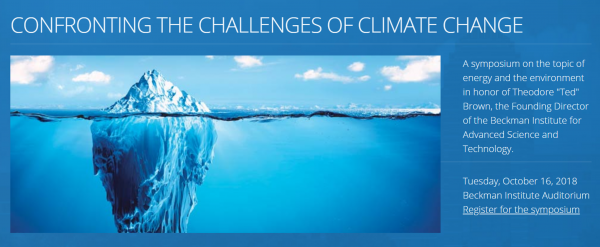U Of I Symposium To Explore Solutions To Climate Change

The Beckman Institute
The University of Illinois will host a symposium on confronting the challenges of climate change.
The symposium will honor Theodore "Ted" Brown on his 90th birthday. Brown is a retired chemistry professor at the U of I and the first director of the Beckman Institute when it was founded in 1983.
Brown says the event will focus on solutions to climate change, including technology that removes carbon dioxide from the atmosphere.
The event is open to the public and begins Tuesday, Oct. 16 at the Beckman auditorium in Urbana. Find a full list of speakers at the Beckman website.
Brown spoke with Illinois Public Media about how society has changed since the 1970s, when he wrote his first book about climate change.
The following is a transcript that has been edited for clarity:
Christine Herman: How have things changed since you wrote the book, "Energy and the Environment" in 1971, in terms of our understanding of climate change.
Ted Brown: I was more interested at that point in trying to understand how human generation of energy would eventually come to be a factor in affecting the climate of the earth. And so that little book was an attempt to spell that out. But when I went around to the publishers, they said, "Nobody's interested in that, we don't even know what you're talking about." And I realized that people weren't conscious about these things. The idea that humans could affect the climate just didn't seem to register on their radar.
CH: That was the 1970s. Now, this is more on people's radars, especially with a recent report from the United Nations' Intergovernmental Panel on Climate Change, written by some of the world's top climate scientists. It concludes that it's technically possible but politically improbable for us at this point to avoid a dangerous level of warming. What was your reaction to that report?
TB: The IPCC is going against the grain of the economy and corporate interests. We have all kinds of politicians who are at the service of the fossil fuels industry, and many large industrial complexes, Exxon-Mobil, the Koch brothers. All these people are deeply involved in producing fossil fuels and making money on them. And they don't want to hear that they have to stop doing that if we're going to save the planet.
And so, what's happening is, climate change is occurring in front of our very eyes, and if we don't stop it, it will go past the point where we could do anything to reverse it.
CH: The UN report concludes that one of the biggest things governments can do to mitigate climate change is put a tax on carbon. But the report also talks about the need for new technologies that can help remove carbon dioxide and greenhouse gases from the atmosphere. Are there technologies out there that can do that?
TB: Well, it sounds like a nice idea. And in fact, this conference at Beckman is going to be about the whole process of "drawdown." There's a great book by Paul Hawken, which talks about the many ways we can do things to draw down the levels of carbon dioxide in the environment. We can do it one way, by just stopping the burning of fossil fuels. But you can do other things as well. One of the speakers Tuesday will be talking about the ways in which he takes carbon dioxide and chemically converts it into products that can be used as plastics and other things. If you can make that work at a large enough scale, then you can maybe make a real difference. But you see, we're producing such vast amounts of carbon dioxide, so, we’re trying to think about how to solve this problem while we are throwing more fuel on the fire, as it were.
CH: There are some who just don't believe humans are causing climate change. Even President Donald Trump has called it a "worldwide hoax." There's a lot of research that shows it's very hard to change people's minds about polarized issues like this. You're turning 90, you've been a scientist your entire career. What have you learned about how to dialogue with people who don't believe in human-caused climate change.
TB: It's a difficult thing to do. People have to be convinced. It's like, this business of sea level. People around in Florida here and in many parts of the world are beginning to see, my God, I could lose my home. We have now storm surges on the east coast of Florida that completely flood streets, people are, in spite of themselves, they're going to have to come to terms with it. And I think it takes a kind of leadership that is very difficult to produce in this country because of our political system, because of our capitalist system. Human nature being what it is, you don't fix something until you absolutely have to. And then unfortunately it may be too late.
Follow Christine on Twitter: @CTHerman
Links
- Climate Change in Illinois Means Frequent Flooding Could Be Normal Within A Decade
- Study: Intensive Agriculture Drives Midwest Climate Changes
- Healthcare Sign-Up Deadline; Sexual Assault In Prisons; Climate Change and Farming; Winter Pets
- Crop Insurance; Teaching Science Through Bad Examples; Faster Trains; Climate Change And Flooding
- EbertFest 2017 Preview With Chaz Ebert; Climate Change, Politics & Religion; Illinois Politics

